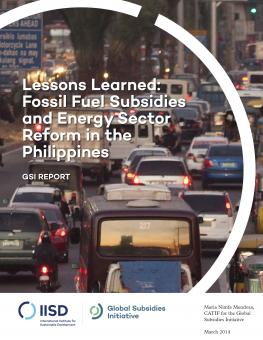
Lessons Learned: Fossil Fuel Subsidies and Energy Sector Reform in the Philippines
The Philippines has removed the majority of all consumer energy subsidies. This detailed case study looks into some of the factors that enabled such durable reforms.
The Philippines has removed the majority of all consumer energy subsidies, successfully phasing out most price subsidies in the downstream oil and electricity sectors in the late 1990s and resisting intermittent demands for their reintroduction.
This detailed case study looks into some of the factors that enabled such durable reforms. This includes slowly transitioning towards higher prices and the use of somewhat targeted subsidies and transfers to provide support for the country's most vulnerable consumers. The Philippines' government has also engaged in proactive efforts to articulate the rationale for price changes, monitor the deregulated market and repeatedly investigate the costs and benefits of reform through a series of high-level independent panels.
This report was originally prepared as a internal background paper to the Global Subsidies Initiative’s (GSI’s) publication A Guidebook to Fossil-fuel Subsidy Reform for Policy-Makers in Southeast Asia.
You might also be interested in
The Cost of Fossil Fuel Reliance
Government support for fossil fuels reached at least USD 1.5 trillion in 2023, new data shows.
Increased Support Needed to Achieve India's Clean Energy Goals
India is on track to achieve many of its 2030 clean energy goals but needs to step up government support measures to accelerate the deployment of offshore wind, electric vehicles, and green hydrogen, according to a new report.
Ending Export Credits for Oil and Gas: How OECD countries can end 2024 with a climate win
For a year now, Organisation of Petroleum Exporting Countries (OECD) governments have been negotiating an agreement that could put an end to oil and gas export finance. Following the acrimony in Baku, this would be a very real way for the OECD to show policy coherence, respond to calls from the poorest countries to stop subsidizing fossil fuels, and shift public finance to solutions.
Fossil Fuel Production, Renewable Energy, and Subsidy Reform in Nationally Determined Contributions 3.0
This policy brief provides an analysis of the critical benchmarks and recommendations necessary for aligning nationally determined contributions (NDCs) with the 1.5 °C target.